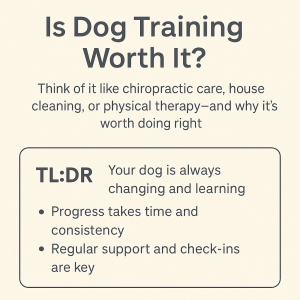Is Dog Training Worth It? The Honest Truth Trainers Want You to Hear!
Is dog training is worth it? Learn how it compares to chiropractic care, PT, house cleaning, and more—and why it's never one-and-done.
Many people wonder, “Is dog training worth it?” — especially when life gets busy or progress slows down. But like any lasting investment, it’s not about quick fixes—it’s about long-term results.
The other day, my husband and I were talking about the chiropractic care package I bought. It was $3,500 and included tons of sessions with a plan—3 times a week, then 2, then tapering off to once every other week. I didn’t stick to the schedule perfectly because, well, life. But I’ve used almost all my sessions and now I’m down to the last three. And I told him, “I think I need to do another round.”
He gave me that playful-but-also-serious look and said, “See, that’s the thing—chiropractic care doesn’t work. You always have to go back.”
Now, I get it. That’s a common take. But I told him, “Actually, it does work. I’m not going back because it failed. I’m going back because it helped—and because I want to keep functioning at this level.”
My body’s always changing. I do a lot—running a business, training dogs, lifting stuff I probably shouldn’t. My headaches lately? Probably from tilting my head funny to avoid putting pressure on my new cartilage piercing. That wasn’t in the original care plan, but it’s where we are now. So I go in, get adjusted, talk through what changed, and get guidance on how to prevent it in the future.
And shoutout to my chiropractor, Barham Chiropractic in Sacramento—they’ve helped me understand my body in ways I never did before.
This Is Why Dog Training is Worth it In The Long Run
If you’ve ever questioned, “Is dog training worth it?” this is where the answer starts to make sense: it’s a partnership, not a transaction.
When you buy a dog training package, you’re not paying for a one-and-done solution. You’re signing up to learn what’s going on, build new skills, and understand how to support your dog. The trainer is like your canine chiropractor: they help you troubleshoot the root issue, guide you through changes, and give you the tools to keep things running smoothly.
But just like I didn’t always follow my chiro plan perfectly, life happens for dog owners too. You miss a session. Your dog backslides. Something unexpected—like a dog park incident or a scary noise—throws off your progress.
So you come back. Or maybe you just check in. Or maybe you stay involved through group classes, not because your dog “failed,” but because you enjoy it, and it helps you both stay sharp.
Your Dog Will Keep Changing—So Should Your Support
Training “worked.” But life keeps happening. Dogs grow. Environments change. Maybe your dog gets older and more reactive. Maybe they go through a fear phase. Maybe your work schedule shifts and now your daily routine is all off.
It’s not failure—it’s just life. And when you have a trainer you trust, it’s a lot easier to pivot.
Dog Training vs. Other Support Services
Physical Therapy: You don’t go once and stay pain-free forever. You learn stretches, build habits, and check in when needed.
House Cleaning: You can deep clean once, but it won’t stay clean unless you maintain it. Let it go too long? It’s a bigger mess—and costs more to fix. That’s why I work with Prestigious Cleaning Services, who help keep my space (and my sanity) in check.
Parenting: You don’t send your kid to preschool and say, “Welp, they’re good now.” You stay involved, adapt, support, and learn alongside them.
Dog training is no different. It’s a living relationship between two constantly evolving beings. Training “ends” when life does—and even then, it might still continue in memories and stories.
So, Is Dog Training Worth It?
Let’s be honest—dog training isn’t something you do once and never think about again. It’s a process, a relationship, and a set of habits that shape your dog’s behavior for the long haul.
So, is dog training worth it? Absolutely. But only if you show up and do the work. Ghost your trainer, cancel sessions, or skip the homework? You’ll probably fall behind.
Stay consistent—even with small check-ins—and you’ll keep making progress. It’s no different than taking care of your own body, your home, or your relationships.
It’s not about perfection. It’s about progress, support, and building something that lasts. Great training meets you where you’re at—and grows with you, just like life.


